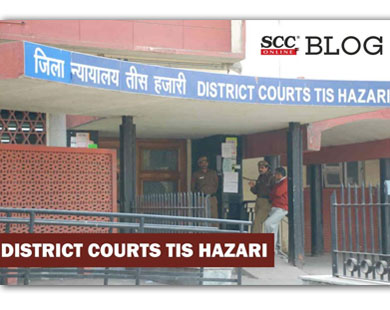Tis Hazari Court, Delhi: In a case wherein a complainant had instituted an application under Section 156(3) of Criminal Procedure Code, 1973 (“CrPC”) against the petitioner and doctors of LNJP Hospital for medical negligence, Dheeraj Mor, Additional Sessions Judge set aside the impugned order passed by the Trial Court whereby the Trial Court directed that an FIR be registered against the petitioner. The Court further held that there was no justifiable reason to assume that the petitioner committed any offence into the allegations made by the complainant and therefore, FIR could not be registered on the whims and fancies of the complainant guided by unfounded and unsubstantiated assumptions only to satisfy his discontentment with the treatment of his child.
Background
The complainant had instituted an application under Section 156(3) of CrPC against the petitioner and doctors of LNJP Hospital for the offences punishable under Sections 323, 325 and 468 of Penal Code, 1860 (“IPC”). The allegations in the complaint were that the complainant's son was born in 2003 at LNJP Hospital and was diagnosed with blockage/layer in the urinary bladder. The son remained under treatment given by the petitioner from 2004 till 2005. It was further alleged that the scan in 2003 was performed regarding the functioning of the kidneys of his son and as per the report, his kidneys were found normal with partial mechanical obstruction. In 2004 and 2005, more kidney scans were conducted where the complainant's son's left kidney was enlarged, and its glomerular function was found mildly impaired.
It was alleged that the petitioner concealed from the complainant that his son’s condition was not improving and in 2005, the petitioner performed nephrecetomi operation (removal of kidney) on the complainant's son and he was informed that his son's left kidney was removed, though earlier he was informed that it was functioning properly, and it was not required to be removed. The complainant had further alleged that the left kidney of his son was removed without seeking his consent and the petitioner had even fabricated documents to cover up his illegal acts. Moreover, due to the influence of the petitioner, the fair inquiries were not conducted by the DMC (Delhi Medical Council) and NHRC (National Human Rights Commission). After considering the complaint, the Trial Court directed that an FIR be registered against the petitioner.
Analysis, Law, and Decision
The Court relied on Jacob Mathew v. State of Punjab, (2005) 6 SCC 1 (Jacob Mathew), wherein the Supreme Court held that “a private complaint might not be entertained unless the complainant had produced prima facie evidence before the Court in the form of a credible opinion given by another competent doctor to support the charge of rashness or negligence on the part of the accused doctor. The investigating officer should, before proceeding against the doctor accused of rash or negligent act or omission, obtain an independent and competent medical opinion preferably from a doctor in government service qualified in that branch of medical practice who can normally be expected to give an impartial and unbiased opinion applying Bolam’s test to the facts collected in the investigation.
The Court further relied on Dr. Krishna Devi v. State of Chhattisgarh, 2019 SCC OnLine Chh 47 wherein it was held that the principles of law laid down by the Supreme Court in Jacob Mathew were also applicable and relevant at the time of directions for registration of FIR under Section 156(3) of CrPC.
The Court noted that in the present case, five independent and separate inquiries were conducted by the medical professionals/ experts into the allegations made by the complainant against the petitioner. In all the said inquiries, the medical experts had categorically concluded that no negligence could be attributed on the part of the petitioner in the treatment of the son of the complainant. They had concluded that there was nothing on record that prima facie substantiated the allegations of the complainant. The Court further noted that in the inquiry conducted by Ministry of Health and Welfare, Government of India, it was opined that the surgeon/petitioner exercised a reasonable degree of commitment in treating the difficult case of the son of the complainant.
The Court opined that the Trial Court had wrongly observed that the purpose of the inquiry by the said committee was only to ascertain whether there was any procedural irregularity, whereas, on the contrary, all the inquiry reports had absolved the petitioner of negligence in treatment and operation of the son of the complainant. The Court further opined that there was not even an iota of incriminating material against the petitioner on record in the form of a report of a competent doctor or committee of doctors, specialized in the field relating to which the medical negligence was attributed. Moreover, the ill preservation of removed kidney of the son of the complainant and misplacement of part of his treatment record did not fall within the ambit of any culpable act. The same could at most be a case of civil negligence, for which FIR could not be directed to be lodged. Thus, the Trial Court had wrongly placed reliance on the facts to invoke its powers under Section 156(3) of
The Court opined that an FIR could not be lodged on the whims and fancies of the complainant guided by unfounded and unsubstantiated assumptions only to satisfy his discontentment with the treatment of his child. Therefore, the Court held that there was no justifiable reason to assume that the petitioner committed any offence into the allegations made by the complainant. Thus, the Court allowed the revision petition and set aside the impugned order passed by the Trial Court.
[Dr. Y. K. Sarin v. Ravinder Nath Pandey, 2023 SCC OnLine Dis Crt (Del) 1, decided on 9-2-2023]
Advocates who appeared in this case :
For the Petitioner: Advocate Namit Saxena
For the Respondent: Advocate Ashesh Kumar
*Judgment authored by: Justice Dheeraj Mor
*Simranjeet Kaur, Editorial Assistant has reported this brief







